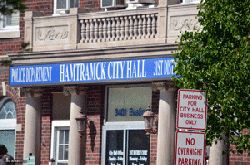HAMRAMCK — The Nov. 5 municipal elections left the Arab American community in Hamtramck with no representation in the City’s incoming government.
The two Yemeni American candidates, Dr. Abdul Algazali, who was running for mayor, and Rashad Almasmari, who was running for city council, lost by a small margin in an election where only 24 percent of the city’s registered 11,859 voters cast their ballots.
Hamtramck, which is almost completely bordered by Detroit, is one of the most ethnically and religiously diverse cities in the country. According to the 2010 Census, 41 percent of the city’s 22,000 residents are foreign-born. Thousands of the city’s residents are of Polish descent, and it is also home to large African-American, Yemeni and Bangladeshi communities.
Hamtramck’s finances are currently supervised by Cathy Square, a state-appointed emergency manager, whose position is similar to that of Kevyn Orr in Detroit.
Algazali, who is currently serving his second term as a city council member, lost to incumbent Mayor Karen Majewski by 98 votes. He could not be reached for comment by The Arab American News. He became sick in the week leading up to the elections and was reported by two supporters to be still struggling with illness.
Algazali finished first in the August mayoral primary.
Bill Meyer, a supporter of Algazali and the founder of OneHamtramck, a group that looks to promote diversity in the city, said the outgoing councilman’s illness in the week before the elections prevented him from connecting with voters at a crucial time.
Algazali came under attack from his opponent for owing the City property taxes on one of his buildings.

|
| Hamtramick City Hall. |
Meyer, however, played down the controversy as an honest mistake that was blown out of proportion by Algazali’s opponents and Hamtramck’s local newspaper.
“He is a principled, ethical person,” Meyer said of Algazali. “All charges against him were false. He was not trying to cheat on the City. I have seen him in action. He never turns anybody down and rarely says anything bad about anybody.”
Meyer added that Algazali did not spend a lot of money on his campaign or engage in negative campaigning.
“He is not a politician, just a human being, who wants to help the community,” he said.
Almasmari, who fell 34 votes short of a city council seat, told The Arab American News that racial and religious divisions helped shape up the recent elections.
“There are divisions among the people in the city,” he said. “Certain groups work together and many people based their votes on the background of the candidates, not what they can do for the city.”
Almasmari, who has a degree in criminal justice from Northeastern Illinois University, added that he was not disappointed with the Yemeni community’s turnout.
“The campaign was great, and people in the Yemeni community voted in large numbers,” he said. “The result was not expected.”
Almasmari acknowledged that there have been political divisions within the Yemeni community in the past, but he stressed that the community was united in this election.
He added that the shortcomings of the election could be overcome by educating the youth about the importance of political participation and encouraging them to get involved in government.
He said that Yemeni and Bangladeshi candidates, who are Muslim, were working together. He added that he did unexpectedly poorly in absentee ballots, sent by mail, which made the difference that resulted in his loss.
However, Almasmari criticized ethnicity-based campaigning, saying that politicians should appeal to and work for everybody in the city.
“Government officials should represent everybody in the city, so Hamtramck can be one community,” he said. “I tried to work with all people, but race still exists as a factor in politics here.”
After the reelection of Mohammed Hassan and the election of Abu Musa, three of Hamtramck’s six-member City Council will be of Bangladeshi origin.
Almasmari called on Hamtramck’s elected officials to ensure greater diversity in the city’s departments by hiring Yemeni-Americans.
“There are posts that qualified Yemeni-Americans can fill,” he said. “We also want the City to facilitate opening new businesses and treat everyone equally.”






Leave a Reply